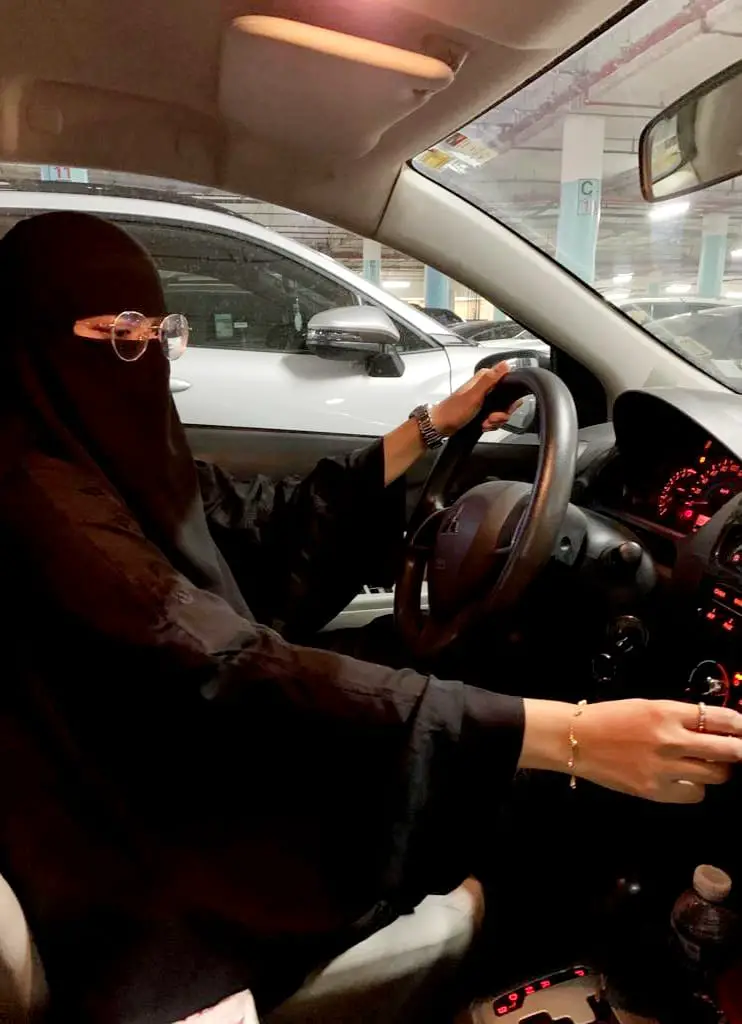Recently, a good friend came from overseas to visit me in Saudi Arabia. When we were out together, she noticed the separate seating areas for single men and families in restaurants and public places.
She asked me why.
I told her that although it is no longer compulsory, men and women still prefer to sit and eat in separate spaces. The laws regarding this has changed. However, I was unsure why they still do.
So, I decided to investigate, check with the Saudi government, ask religious Saudi and non-Saudi Muslims and friends, and I learned the following information.
Written by Mohamed Francis & Maryam Hussain
& Maryam Hussain

In Saudi Arabia, Why Do Men and Women Still Sit Apart?
Saudi law no longer requires men and women to sit apart in public. However, the majority of Muslims prefer separation since it serves to protect modesty (Haya), reduce sexual distractions (Fitnah), and casual sexual relations (Zina). It is also a long-held Saudi and Islamic tradition.
Of course, for close family members such as fathers, mothers, uncles, aunts, brothers, and sisters, there is no Islamic requirement to separate at home or in public spaces.
The restrictions ONLY apply to unrelated, (non-Mahram) family and friends.
In addition, millions of non-Muslim visitors coming to Saudi Arabia for tourism are not used to seeing the sexes separated in public.
Even in Muslim countries, men and women respectfully work and interact together at the job and when out and about.
So the following article explores why gender segregation exists in Islam and 7 important reasons why it will continue in Saudi Arabia.
Table of Contents
(Click to jump to section and back arrow to return)
- Men And Women Can Sit Together (Halal) But Not In Private
- Men And Women Sit Separately To Protect Modesty (Haya) -The Story of Zara
- Separate Seating For Men And Women Reduces Distraction (Fitnah) -The Story of Asmaa
- Men and Women Sitting Apart Prevents Casual Sexual Relations (Zina) -The Story of Fatima
- Separation Of The Sexes Socially Wards Off Marital Problems -The Story of Ismael
- Religious Muslims Avoid Sitting With The Opposite Sex
- Separation of Men And Women Is An Age-Old Saudi Tradition
- Related Questions
- References And Useful Links
1. Men And Women Can Sit Together (Halal) But Not In Private.
Contrary to popular belief, in Saudi Arabia and Islam, it is permissible (Halal) for unrelated men and women to sit, socialize and mix for work, business, or for any other purpose.
However, they are NOT allowed to be alone in a private space (Khalwah).
If men and women must meet, their interactions should have specific intentions, outcomes, and conditions.
Unrelated men and women should only be seated together while other relatives or friends (Muharam) are present and can hear their conversations.
Having a witness to a conversation between unrelated men and women is to prevent the possibility of emotional and physical relations occurring between the individuals concerned.
Sitting Together (In Private) Often Leads To Complications
Islam trusts people to decide with logic. However, private encounters provide opportunities for temptations that lead men and women to act on their sexual urges, resulting in (Fitnah) adultery and extramarital affairs.
Rather than logic, we tend to act on such feelings and often regret doing so later when things go badly wrong.
For these reasons, Islam strongly encourages unrelated men and women not to put themselves in situations that likely result in such outcomes.
Sitting Together (With Other People) Staves Off Complications
The social restrictions on unrelated men and women do not prevent them from working together, doing educational classes, projects, or having social relations, and the like as long as other people (Muharam) are present.
However, there should not be any physical closeness and contact, no touching, and no open or intimate socializing, and a proper Islamic dress code always be observed.
The following article explains the headscarf (Hijab) and for reasons of modesty (Haya) they continue wearing it in Why Do Muslim Women Wear Headscarves (Hijab حجاب)?
Men might also like to read the Common Sense Guide To How (Non-Saudi) Men Should Dress In Saudi Arabia. It gives useful information (and reasons) about what male visitors should and should not wear when visiting the kingdom.
It gives useful information (and reasons) about what male visitors should and should not wear when visiting the kingdom.
2. Men And Women Sit Separately To Protect Modesty (Haya)
Unrelated Muslim men and women purposefully sit apart separately to protect modesty (Haya).
Islam says modesty (Haya) is the natural shyness of both men and women.
Physical distancing serves to lessen the provocation of natural shyness with members of the opposite sexes and to protect social reputation.
Men are visual creatures, and women are very alluring.
By restricting the possibility of physical association between the sexes, feelings of sexual desire lessen. It also helps to ward off unwanted male attention for the opposite sex and vice versa.
Allah (SWT) in the Holy Quran Surat Al Nur 30:31 instructs men to ‘lower their gaze’ when looking upon women.
The verse explains that lowering the gaze is ‘purer’ for men.
Purposefully not looking at beautiful women prevents craving and sexual desire from arising in their hearts and significantly decreases the possibility of private encounters between men and women ever taking place.

‘Oh Prophet!˺ Tell the believing men to lower their gaze and guard their chastity. That is purer for them. Surely Allah is All-Aware of what they do”
Surat Al Nur 30:31
Story of Zara – A Friend Of Her Husband Wants A Casual Affair
Sister Zara told me how ignorance of Islam may have resulted in a big problem in her marriage.
Zara‘s husband, Ahmed, has a close group of male friends who often meet socially with their wives and families.
During their social meet-ups, the male and female friends eventually let go of their reserve and became very familiar with one another.
Zara sees one married woman sniggering and enjoying a private joke with the husband of another woman. She believes this is not appropriate, but keeps quiet. Zara is a newly-wed and feels embarrassed to raise the matter with her husband.
The social gatherings continue for several months until one day, one of her male friends calls Zara at home while she is alone.
Zara tells the man that her husband has not yet come home. He answers that he is aware of that fact.
He calls Zara for a specific reason to communicate that he feels very attracted to her and proposes that they meet up alone.
Zara quickly ends the telephone conversation and feels quite upset. She later tells her husband what has occurred and that she feels upset, angry, and disrespected.
Finally, Zara and her husband have not given much thought to the matter before beginning to understand the dangers of the free mixing of men and women.
Open social relations with no boundaries lead to attraction, temptation, and illicit affairs. Zara and her husband cease having social meetings with members of the opposite sex.
3. Separate Seating For Men And Women Reduces Distraction (Fitnah)
Sitting Muslim men and women apart helps reduce sexual distraction (Fitnah) and eliminates tension and attractions brought about by the physical proximity of the sexes.
Meeting in private and out of sight can easily cause men and women to act on their sexual urges, resulting in (Fitnah), adultery, and extramarital affairs.
Conversely, staying apart helps reduce physical contact, sexual stimulation, and attraction to the opposite sex, eliminating the actions that inevitably lead to unethical or previously unwanted relations.
Despite any initial good intentions of both men and women as they begin to socialize, attraction and desire for members of the opposite sex can easily take them over.
Even though a man and woman marry, being alone with unrelated members of the opposite sex does not make them immune to the devil’s (Shaytan) evil whispers and his devious manipulation.
In a Hadith, Al Tirmidhi reports Prophet Mohammed (SAW) saying, ‘No man is alone with an unrelated (non-mahram) woman, but the devil (Shaytaan) is the third one present.’
Al-Tirmidhi, 2165- Saheeh Al Albani 1758
Story of Asmaa – A Private Male Tutor Tries it On
Asmaa was 16, needed help learning maths and lived with her mother in Cairo, Egypt.
So, her mother provided a private male tutor called Aron aged 28. He was a non-Muslim and came to the family home to tutor her.
Asmaa‘s mother often sat close by during the sessions. Aron was an excellent teacher, and Asmaa loved his way.
In the class, her mother sometimes took a short nap.
After a time, Aron started to act weird. He would touch Asmaa’s hand as if by accident and then say it was in error.
He would also look at her intently.
Asmaa thought little of it and was eager to continue classes. Aron mistook her enthusiasm and believed she was responding to his own physical interest in her.
One day, Aron entered their home uninvited. Asmaa heard a sound from her room and went to the hallway to check who was there.
However, she did not wear a headscarf (Hijab) or a cloak (Abaya). When Aron saw Asmaa, she quickly ran to her room, but it was too late.
He had seen her without a covering on her head.
The private classes continued, and during these sessions, Aron began challenging the Islamic injunction on women to cover their hair and bodies in loose clothing.
He argued that female natural beauty should be open for all to see. Asmaa ignored his arguments and repeatedly tried to direct the conversation back to the lessons at hand.
However, Aron continued trying to persuade Asmaa to go out and date him.

Aron was persistent, and his accidental touches increased and became a nuisance by pressing Asmaa to have a relationship with him.
One day, Asmaa’s uncle visited the home and saw Asmaa and Aron sitting alone in private and raised his concerns. He protested, and eventually, the private classes stopped.
At the time, Asmaa was too young and naive. She did not know how to handle his advances. In fact, she found the whole thing disgusting and felt relieved that the classes ended.
In hindsight, Asmaa understood that meeting a male tutor in private meant she was venerable and exposing herself to danger.
Today, she has her own daughters and has vowed never to allow private male tutors in the home.
4. Men and Women Sitting Separate Prevents Casual Sexual Relations (Zina)
Having separate seating areas for the sexes prevents or significantly reduces the likelihood of prohibited sexual relations (Zina).
Lessening illicit sexual relations help circumvent the problems plaguing permissive Western societies such as unwanted pregnancies, illegitimate children, and the breakdown of families and the social fabric.
In the Surat Al Israh 17:32 , Allah (SWT) orders mankind not to
, Allah (SWT) orders mankind not to
“come close to unlawful sexual intercourse (Zina) since it is a heinous deed and an evil way.’
The Holy Quran Al Israh 17:32
The following story shows how free mixing of the sexes potentially leads to illicit love relations.
The following story illustrates how one religious Muslim woman lost everything; her modesty (Haya) and good reputation.
Story of Fatima – From Religious Muslim To A Loose Cannon
Sister Fatima relates a story of the difficulties she had encountered due to letting her guard down around men.
In her job, Fatima would avoid males and wear her face veil (Niqaab).
Work colleagues constantly teased her and accused her of being introverted, antisocial, and extreme in her views.
However, for all of this, she remained cheerful and upbeat and avoided mixing freely with unrelated men to safeguard and protect her chastity and modesty.
However, she also wished to be accepted by her work colleagues.

The remarks about her were disturbing, and she wanted to show that she was not a cold person and a killjoy as they always maintained.
She felt pressured to be different.
So instead of avoiding male work colleagues, she decided to have social relations with them.
At first, she felt awkward, but later she started to feel comfortable and to enjoy it. In conversations, the men she knew insisted that she remove her veil to reveal her face.
She reluctantly complied, and a few months later, she took the headscarf (Hijab) off permanently.
Doing so felt good as Fatima was getting the attention of her male colleagues. She had no idea she was playing with fire by letting her guard down in front of her male colleagues.
On seeing her beautiful face without a headscarf (Hijab), a male coworker began showing interest in her.
Fatima started a relationship with him even though this man was already married to another woman and had children. The love relationship grew until it became sexual fornication (Zina).
Colleagues and the people around Fatima commented just how much she had changed and began to say she was a loose woman.
Inevitably, her illegitimate relationship ended, and she got fired from her job.
Her poor judgment in allowing the criticism of others to change her behavior cost her modesty (Haya) and led to open sexual distraction (Fitnah) and a prohibited sexual relationship (Zina).
To this day, Fatima greatly regrets her actions and feels sincere remorse.
The following article shows how jealously (Gheerah) and how Allah (SWT) teaches us how to regard unrelated women in answering, Why Do Muslim Men And Women Eat Separately In Saudi Arabia?
5. Separating The Sexes Socially Wards Off Marital Problems
Men naturally want to have sexual relations with more than one woman.
However, casual encounters with females other than the wife can lead to the possibility of cheating in marriage and secret affairs.
Therefore, separate seating arrangements and the expectation that men cannot easily socialize with other, non-related women lessen the chances of such encounters ever occurring.
The following story shows how free mixing of the sexes potentially leads to illicit love.
Sad Story of Ismael – His Wife Wants A Casual Affair

Brother Ismael relates a heartbreaking tale about his wife and a so-called best friend. This brother often hosted gatherings for his friends and their families at home.
Every weekend, he invited them to come to his home to relax, have fun and socialize.
All of his friends are married and have children, and the one best friend, however, began having feelings for Ismael‘s wife.
His so-called best friend secretly approached Ismael’s wife, and their encounters quickly developed into an affair about which Ismael knew nothing.
Two years later, Ismael learned about his best friend and wife’s affair. He divorced her, and she married his best friend.
This illicit affair broke up families and hearts. Friends rejected Ismael‘s best friend and his ex-wife compelling them to move to another city.
This story is a clear example of what occurs of what occurs by ignoring the requirement in Islam to keep unrelated men and women apart.
6. Religious Muslims Avoid Sitting With The Opposite Sex
In Saudi Arabia, most Muslims are naturally shy (Haya) and committed to practicing Islam. They purposefully avoid social situations where free mixing is possible.
Though much fewer, other Muslims are more liberal and relaxed and gravitate toward situations where it is easy for men and women to meet up socially.
Some people have separate arrangements for men and women out of preference. This preference is because they feel uncomfortable and shy (Haya) around members of the opposite gender.
In Islam, the man must provide for his wife and to protect her in every way.
Having separate seating arrangements for men and women will help the men to protect their women from unwanted attention and temptation from the opposite gender and vice versa.
In the Holy Quran Al Araf 7:17 , Allah (SWT) relates how the devil (Ibliss) promises to lead men astray.
, Allah (SWT) relates how the devil (Ibliss) promises to lead men astray.
Satan says,
‘For leaving me to stray, I will lie in ambush for them on your straight path.
I will approach them from their front, back, right, left, and then you will find most of them ungrateful.’
The Holy Quran Surat Al Araf 7:16-17
7. Separation of Men And Women Is An Age-Old Saudi Tradition
For generations in Saudi Arabia, the separation of unrelated male and female family members has been strictly observed at home and in public.
Segregating unrelated men and women in the home and in mosque prayer areas is standard Islamic practice. Such separation is for family and religious reasons.
Also, older children are separated at school and in college. In class, women study with other women only and men with men.
Work and Social Changes That Test Tradition

Today, Saudi Arabia has introduced jobs for women in administration and in traditionally male environments.
However, most Saudi educational centres still have male teachers for boys and men and female teachers for girls and women students.
Saudi Arabia now offers positions for women in management and other traditionally male fields.
Previously, male doctors only treated male patients and females treated only other females. Today, it is commonplace to see both male and female patients consult doctors of the opposite gender.
The difference is that people are generally more tolerant today of the mixing of the sexes on the job and in public places.
However, there is still much less gender mixing than in more liberal Muslim or non-Muslim countries.
Recent social changes—more women in the workplace, greater tolerance, and a lessening of restrictions due to modernization, tourism, and social openness have resulted in greater acceptance of the mixing of the sexes in public.
Less Segregation Equals More Women’s Freedom
In Saudi Arabia now, there is much less gender segregation in most public spaces such as restaurants and cafés.
Also, women are free to drive, work, and travel alone, whereas in the past, these activities were not allowed and unacceptable.
Nowadays, men and women can freely work together in a more liberal social environment.
The progress and transitions in Saudi Arabia have impacted the customs and are causing traditions to change.
In general, working people have relaxed and can now mix with people of opposite sexes at work and in public.
Related Questions
What Can Visitors or Tourists Expect In Saudi Arabia? The police and religious authorities can no longer question or interfere with couples regarding mixed gender relations. Those days are over.
What Can Muslim Visitors Expect In Saudi Arabia? The police or religious authorities are no longer permitted to question or interfere when people sit with members of the opposite sex. However, there is still social pressure and the expectation that you behave in public according to Islamic norms and requirements.
References And Useful Links
- I love a religious woman. Can I be with her and look at her face? – Islam Q & A
- Men Should Lower Their Gaze – The Holy Quran Surat An-Nur 30:31
- Speak To Non-Related Women Behind A Screen – The Holy Quran Al Ahzab 33:53
- Men Are In Charge Of Women – The Holy Quran An Nisa 4:34
- No man is alone, but the devil (Shaytaan) is the third one present.’ – At Tirmidhi 2165
- Zina is a heinous deed and an evil way – The Holy Quran Al Israh 17:32
- Why Do Muslim Women Wear Headscarves (Hijab حجاب)?
 Inside Saudi
Inside Saudi - Common Sense Guide To How (Non-Saudi) Men Should Dress In Saudi Arabia
 Inside Saudi
Inside Saudi - Why Do Muslim Men And Women Eat Separately In Saudi Arabia?
 Inside Saudi
Inside Saudi




